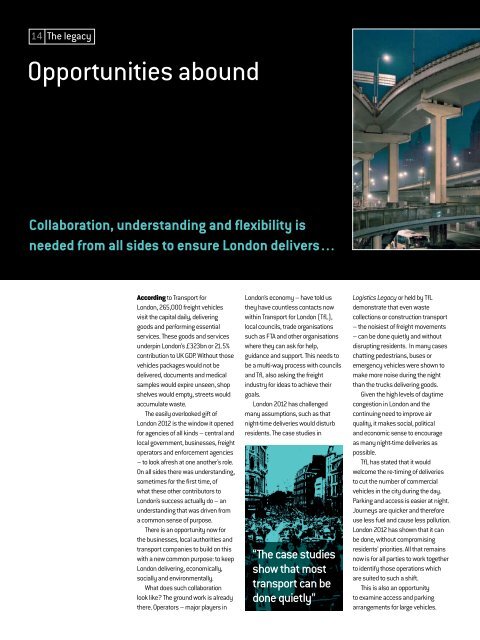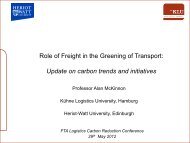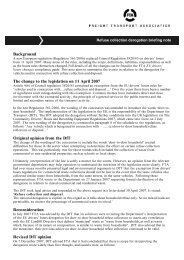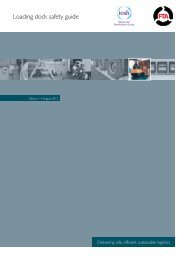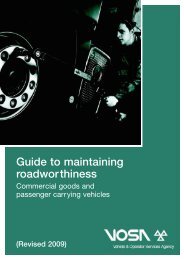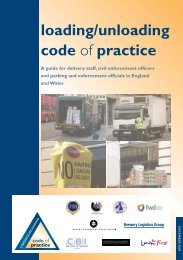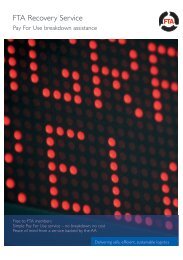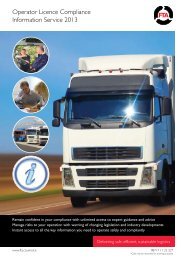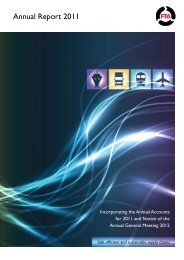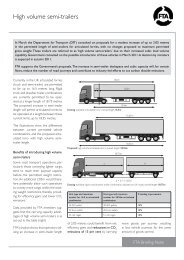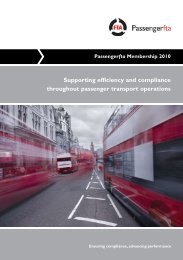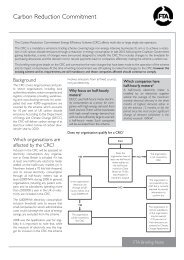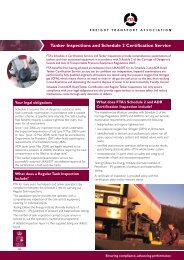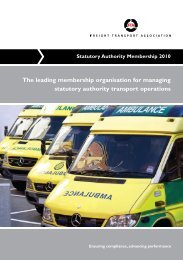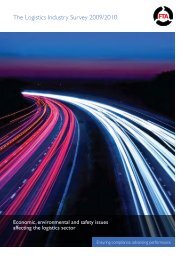Logistics Legacy â Olympics - Freight Transport Association
Logistics Legacy â Olympics - Freight Transport Association
Logistics Legacy â Olympics - Freight Transport Association
Create successful ePaper yourself
Turn your PDF publications into a flip-book with our unique Google optimized e-Paper software.
14<br />
The legacy<br />
Opportunities abound<br />
Collaboration, understanding and flexibility is<br />
needed from all sides to ensure London delivers…<br />
According to <strong>Transport</strong> for<br />
London, 265,000 freight vehicles<br />
visit the capital daily, delivering<br />
goods and performing essential<br />
services. These goods and services<br />
underpin London’s £323bn or 21.5%<br />
contribution to UK GDP. Without those<br />
vehicles packages would not be<br />
delivered, documents and medical<br />
samples would expire unseen, shop<br />
shelves would empty, streets would<br />
accumulate waste.<br />
The easily overlooked gift of<br />
London 2012 is the window it opened<br />
for agencies of all kinds – central and<br />
local government, businesses, freight<br />
operators and enforcement agencies<br />
– to look afresh at one another’s role.<br />
On all sides there was understanding,<br />
sometimes for the first time, of<br />
what these other contributors to<br />
London’s success actually do – an<br />
understanding that was driven from<br />
a common sense of purpose.<br />
There is an opportunity now for<br />
the businesses, local authorities and<br />
transport companies to build on this<br />
with a new common purpose: to keep<br />
London delivering, economically,<br />
socially and environmentally.<br />
What does such collaboration<br />
look like? The ground work is already<br />
there. Operators – major players in<br />
London’s economy – have told us<br />
they have countless contacts now<br />
within <strong>Transport</strong> for London (TfL),<br />
local councils, trade organisations<br />
such as FTA and other organisations<br />
where they can ask for help,<br />
guidance and support. This needs to<br />
be a multi-way process with councils<br />
and TfL also asking the freight<br />
industry for ideas to achieve their<br />
goals.<br />
London 2012 has challenged<br />
many assumptions, such as that<br />
night-time deliveries would disturb<br />
residents. The case studies in<br />
“The case studies<br />
show that most<br />
transport can be<br />
done quietly”<br />
<strong>Logistics</strong> <strong>Legacy</strong> or held by TfL<br />
demonstrate that even waste<br />
collections or construction transport<br />
– the noisiest of freight movements<br />
– can be done quietly and without<br />
disrupting residents. In many cases<br />
chatting pedestrians, buses or<br />
emergency vehicles were shown to<br />
make more noise during the night<br />
than the trucks delivering goods.<br />
Given the high levels of daytime<br />
congestion in London and the<br />
continuing need to improve air<br />
quality, it makes social, political<br />
and economic sense to encourage<br />
as many night-time deliveries as<br />
possible.<br />
TfL has stated that it would<br />
welcome the re-timing of deliveries<br />
to cut the number of commercial<br />
vehicles in the city during the day.<br />
Parking and access is easier at night.<br />
Journeys are quicker and therefore<br />
use less fuel and cause less pollution.<br />
London 2012 has shown that it can<br />
be done, without compromising<br />
residents’ priorities. All that remains<br />
now is for all parties to work together<br />
to identify those operations which<br />
are suited to such a shift.<br />
This is also an opportunity<br />
to examine access and parking<br />
arrangements for large vehicles.


